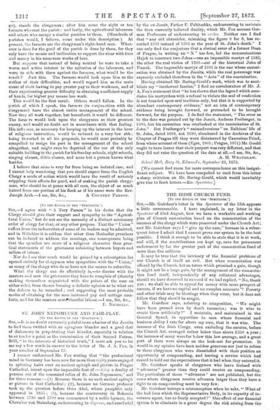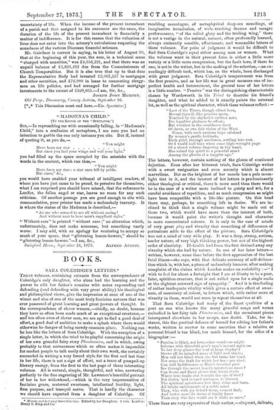THE IRISH CHURCH FUND.
[TO THE EDITOR OF THE "SREOTILTOR.1 SIR,-Mr. Gairdner's letter in the Spectator of the 13th appearsr a little unreasonable. I have explained, in my letter in the Spectator of 23rd August, how we have a workable and working plan of Church sustentation based on the commutation of the incomes of the clergy which were preserved under the Church Act ; and Mr. Gairdner says I " give up the case," because in a subse- quent letter I admit that I cannot prove our system to be the best possible. I think it enough to be able to state that it is at work, and will, if the contributions are kept up, save for permanent endowment by far the greater part of the commutation fund of more than five millions.
It may be true that the intricacy of the financial problems of our Church is of itself an evil. But when commutation was offered by the Church Act on terms which promised a gain, though- it might not be a large gain, by the management of the commuta- tion fund itself, independently of any collateral advantages, should we have deserved to succeed if we had replied, "No, thank you ; we shall be able to appeal for money with more prospect of success, if we have no capital and no complex accounts "? Poverty and other trials may be blessings when they come, but it does not follow that they should be sought.
Mr. Gairdner says, referring to composition, " We might have been pressed even by death vacancies; was it wise to create them artificially ?" I maintain, and maintained in the General Synod, in opposition to men whose financial and business ability I rate far above my own, that it was wise. The incomes of the Irish Clergy, even excluding the curates, before the Church Act, averaged rather below than above £250 a year ; the incomes of many were far below this low average, and a great part of them were always on the look-out for promotion. It would in my opinion have been neither generous nor just to refuse- to those clergymen who were dissatisfied with their position an opportunity of compounding, and leaving a service which had ceased to hold out the expectations that it had when they entered it.
Mr. Gairdner speaks of clergymen who leave Ireland with- " advances" greater than they could receive on compounding. The particulars of these " advances " are not published, but the- cases where clergymen receive advances larger than they have a right to on compounding must be very few.
Mr. Gairdner betrays a misconception when he asks, " What of the bad lives which the Representative Body, in its capacity of in- surance agent, has so freely accepted ?" One effect of our financial• system is to eliminate in a great degree the risk arising from the•
uncertainty of life. When the income of the present incumbent of a parish and that assigned to his successor are the same, the duration of the life of the present incumbent is financially a matter of indifference. It is for this reason that the valuation of lives does not enter into the actuary's calculations respecting the soundness of the various Diocesan financial schemes.
Mr. Gairdner is correct in saying, in his letter of August 30, that at the beginning of this year, the sum, in a technical sense "charged with annuities," was £4,658,221, and that there was an unpaid balance of £3,823,432 due from the Commissioners of Church Temporalities. But it is also true that up to that date the Representative Body had invested £3,067,517 in mortgages and other securities, and £76,980 in loans to commuting clergy- men on life policies, and had arranged for further mortgage investments to the extent of £828,665.—I am, Sir, &c.,
[*,,* This Discussion must end here.—ED. Spectator.]



































 Previous page
Previous page